
In questo venerdì, 9 agosto 2019, foto, i dipendenti lavorano presso Growing Home, La fattoria di Inc nel quartiere di Englewood a Chicago. Atlanta, Chicago e altre grandi città del paese stanno adottando un approccio su più fronti per portare diete sane nei "deserti alimentari, " quartieri per lo più a basso reddito situati a chilometri di distanza dal supermercato più vicino. Le loro iniziative includono stand di prodotti freschi nelle stazioni di trasporto di massa, giardini urbani, e partnership con società di rideshare per trasportare i residenti nei negozi di alimentari e nei mercati degli agricoltori. L'obiettivo è ridurre i disturbi di salute e potenziare le comunità a basso reddito. (Foto AP/Amr Alfiky)
Sulla via di casa, Darnell Eleby si è fermato prima di salire sul treno dei pendolari nella stazione Five Points di Atlanta e ha manovrato la sua sedia a rotelle fino a una fermata che non si vedeva su molte piattaforme di trasporto di massa:uno stand di cibo fresco rifornito di frutta e verdura colorata. Aiutato da un volontario, ha riempito un cesto di banane, mele, mais e zucca e pagati con un buono sanitario.
"Ti aiuta quando non puoi arrivare al negozio, " ha detto Eleby.
A Chicago, gruppi senza scopo di lucro hanno aperto cliniche dove il personale fornisce ai pazienti educazione alimentare e coupon gratuiti per i mercati degli agricoltori della zona pieni di cibi sani. Entrambe le città hanno anche incoraggiato gli sforzi fiorenti per piantare orti urbani.
Le grandi città del paese stanno utilizzando questo approccio su più fronti per portare diete sane nei "deserti alimentari, " quartieri per lo più a basso reddito situati a chilometri di distanza dal supermercato più vicino. Sperano non solo di ridurre i tassi di diabete, ipertensione e obesità, ma per incoraggiare l'attivismo e l'empowerment della comunità.
"Lo stiamo facendo per... responsabilità verso la nostra comunità, "Safia Rashid ha detto del giardino lei e suo marito, Kamau Rashid, hanno curato il South Side di Chicago negli ultimi 14 anni.
La madre di 44 anni ha detto che la coppia ha iniziato a fare giardinaggio quando il loro figlio maggiore aveva 3 anni, per combattere "'apartheid alimentare'... gente che disinveste deliberatamente in questa comunità, togliendoci il cibo sano, "Ha detto Safia Rashid.
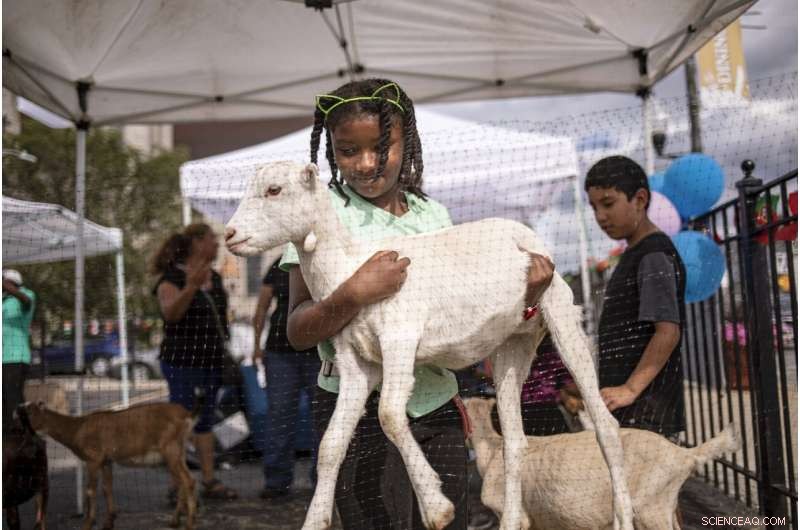
In questo venerdì, 16 agosto 2019, foto, una ragazza porta una capra al mercato degli agricoltori dell'Inner-city Muslim Action Network (IMAN) a Chicago a Chicago a Chicago. Atlanta, Chicago e altre grandi città del paese stanno adottando un approccio su più fronti per portare diete sane nei "deserti alimentari, " quartieri per lo più a basso reddito situati a chilometri di distanza dal supermercato più vicino. Le loro iniziative includono stand di prodotti freschi nelle stazioni di trasporto di massa, giardini urbani, e partnership con società di rideshare per trasportare i residenti nei negozi di alimentari e nei mercati degli agricoltori. L'obiettivo è ridurre i disturbi di salute e potenziare le comunità a basso reddito. (Foto AP/Amr Alfiky)
Il giardino dei Rashid cresce alla South Chicago Farm, un sito di 14 acri (5,6 ettari) sviluppato nel 2015. È una delle otto di queste fattorie a Chicago gestite dall'organizzazione no profit Urban Growers Collective.
Ad Atlanta, molti dei pomodori, le pesche e i peperoni che si trovano nei cestini dei Mercati Freschi MARTA provengono da alimenti coltivati in città e nelle fattorie vicine, disse Ilario Re, dei Community Farmers Markets senza scopo di lucro, che collabora con la Metropolitan Atlanta Rapid Transit Authority per gestire gli stand. Lanciato nel 2015, i mercati MARTA si trovano in diverse stazioni durante la settimana.
"Non possiamo fare affidamento sui tradizionali metodi di vendita al dettaglio, ", ha affermato il direttore dell'agricoltura urbana di Atlanta Mario Cambardella.
Le organizzazioni non profit hanno anche collaborato con la società di ridesharing Lyft per fornire a 300 famiglie a basso reddito corse scontate per i mercati degli agricoltori e i negozi di alimentari di Atlanta. Il programma pilota di sei mesi, chiamato Accesso AgLanta, iniziato il 1 giugno ispirato da una simile partnership Lyft a Washington, D.C.
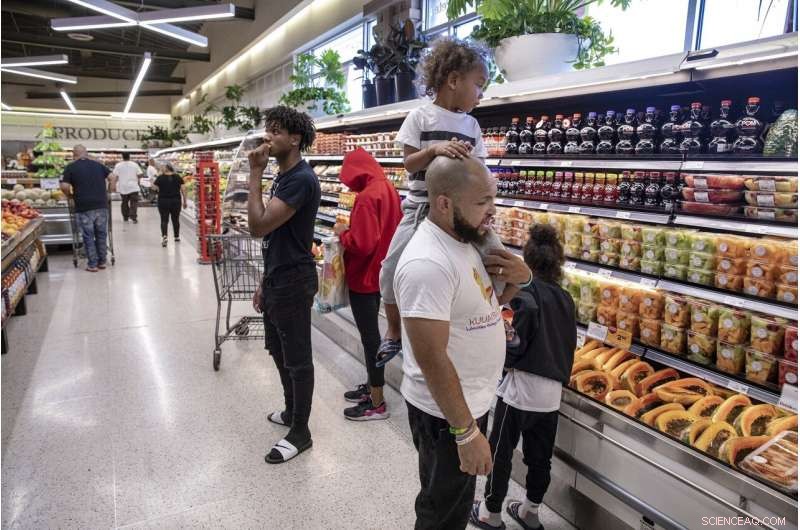
In questo giovedì, 15 agosto 2019, foto, Christopher "Cane Matto" Thomas, porta suo figlio, Rian Gatewood-Hillestad, durante lo shopping al mercato di Pete nel quartiere Garfield di Chicago. Tommaso, cresciuto nel quartiere di Altgeld Gardens nel South Side di Chicago, ha detto che ha sofferto di "'disturbo alimentare del deserto alimentare, ' dove tutto ciò che puoi permetterti di mangiare sono caramelle." Thomas e sua moglie, fare un viaggio settimanale fuori dal loro quartiere in questo negozio, che sua moglie descrive come "i Whole Foods neri o ispanici". (Foto AP/Amr Alfiky)
"Ciò che abbiamo sentito spesso nel corso degli anni è che il trasporto è un'enorme barriera all'accesso al cibo, " ha detto Alysa Moore, program manager for Georgia Fresh For Less, which provides state residents who receive food stamps with financial assistance to shop at farmers markets.
Eleby relies heavily on the transit platform markets. Senza di loro, Egli ha detto, he'd be forced to rely on a small scattering of stores in his low-income neighborhood in southwest Atlanta where he said he has to smell food or examine it for mold before buying it. The food there, Egli ha detto, isn't "like it's supposed to be."
As of 2015, roughly 22% of Atlanta's population was living in a low-income community more than a mile from a food store, according to the U.S. Department of Agriculture.
In Chicago, that number is 5%. Comparatively, the number in Seattle is 7.8%; Washington, DC, 6.4%; Baltimora, 4.3%; and Milwaukee, 3.5%, according to the USDA.
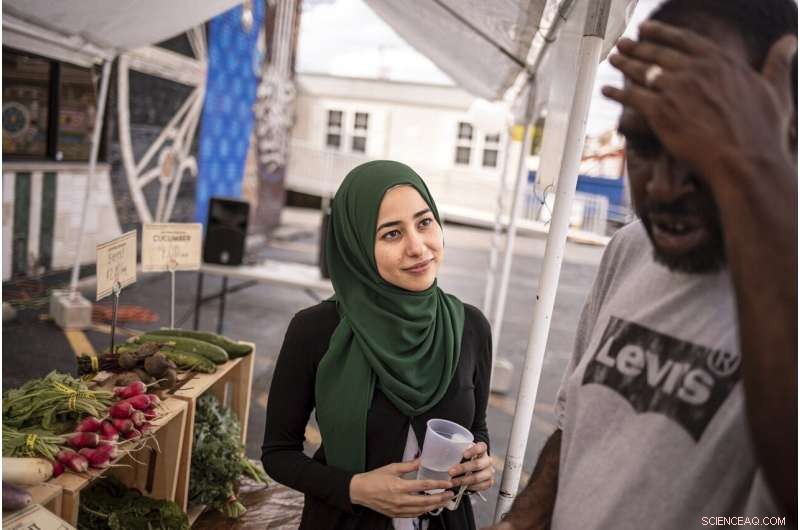
In questo lunedì, 19 agosto 2019, foto, dietitian Heba Abdel Latief, Giusto, talks to her patient, Richard Ware, at Inner-city Muslim Action Network's (IMAN) farmers market in Chicago. IMAN offers free of charge dietitian visits at their health clinic. Atlanta, Chicago and other large cities across the country are taking a multi-pronged approach to bringing healthy diets to "food deserts, " mostly low-income neighborhoods located miles away from the nearest supermarket. The goal is to reduce health disorders and empower low-income communities. (AP Photo/Amr Alfiky)
Christopher "Mad Dog" Thomas, 34, who grew up in the Altgeld Gardens neighborhood on Chicago's South Side, said he has suffered from "'food desert eating disorder, ' where all you can afford to eat is candy."
Thomas and his wife, Kathryn Gatewood, make a weekly trip outside their neighborhood to a store called Pete's Supermarket, which Kathryn Gatewood describes as "the black or Hispanic Whole Foods."
"We spend almost 40% of our paychecks combined to ensure a healthier diet for our kids, " lei disse, adding that it is a better alternative than buying bad food from the "dusty shelves" of corner stores in Englewood.
The Chicago nonprofit Inner-City Muslim Action Network has launched "The Corner Store Campaign" to change that.
Sami Defalla, who runs the Morgan Mini Mart in Englewood, has been an active partner with the campaign for more than two years. Defalla has created a "green zone" in the store where shoppers can purchase inexpensive fresh fruits and vegetables.
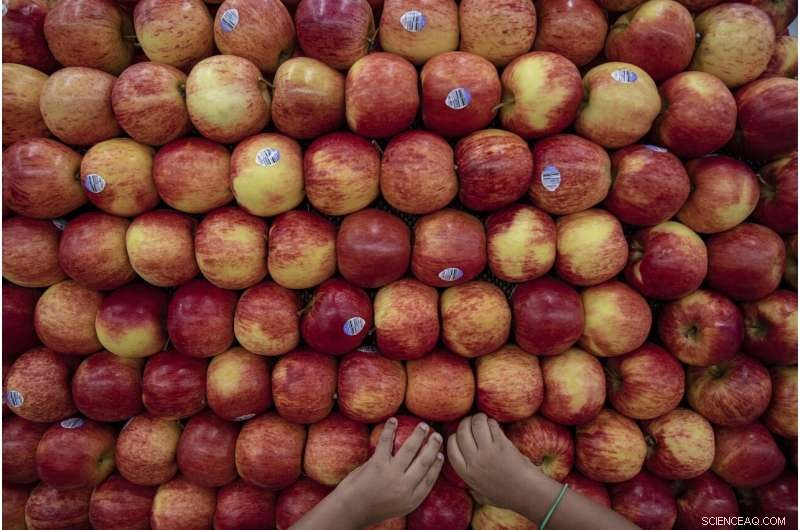
In questo giovedì, Aug. 15, 2019, foto, Rian Gatewood-Hillestad plays with apples while shopping with his parents at Pete's Market in Chicago's Garfield Neighborhood. Christopher "Mad Dog" Thomas, Rian's father, organizes a weekly family trip outside their neighborhood to Pete's Supermarket, which his wife describes as "the black or Hispanic Whole Foods." (AP Photo/Amr Alfiky)
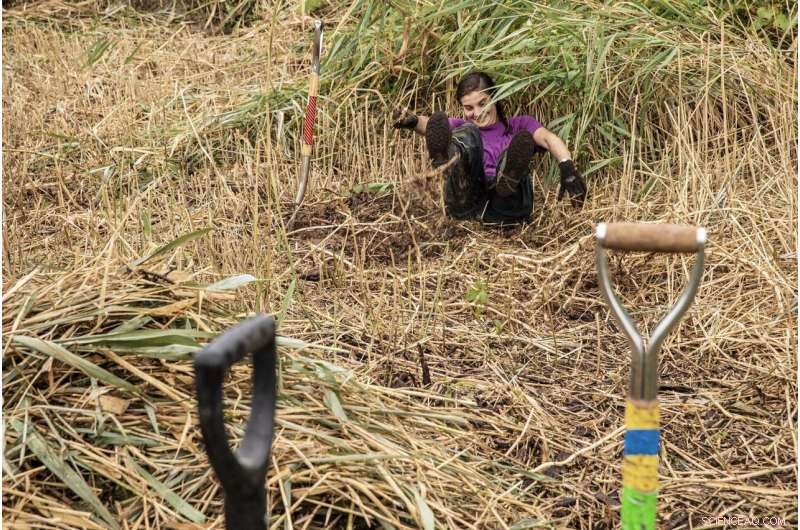
In questo sabato, Aug. 17, 2019, foto, Viviana Gentry Fernandez-Pellon, co-founder of Cooperation Operation, smiles as she falls on her back while working to clear section of high weeds and brush to create a new space for an organic produce garden in the Pullman neighborhood of Chicago. Large cities across the country are using a multi-pronged approach to bring healthy diets to "food deserts, " mostly low-income neighborhoods located miles away from the nearest supermarket. They hope not only to reduce rates of diabetes, high blood pressure and obesity, but to encourage community activism and empowerment. (AP Photo/Amr Alfiky)
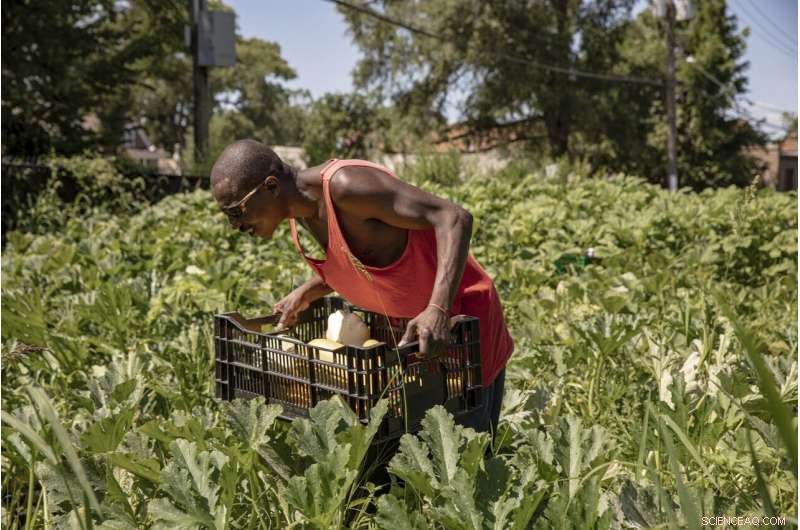
In questo venerdì, 9 agosto 2019, foto, Stanford Williams works at the Growing Home, Inc. farm in Chicago's Englewood neighborhood. Large cities across the country are using a multi-pronged approach to bring healthy diets to "food deserts, " mostly low-income neighborhoods located miles away from the nearest supermarket. They hope not only to reduce rates of diabetes, high blood pressure and obesity, but to encourage community activism and empowerment. (AP Photo/Amr Alfiky)
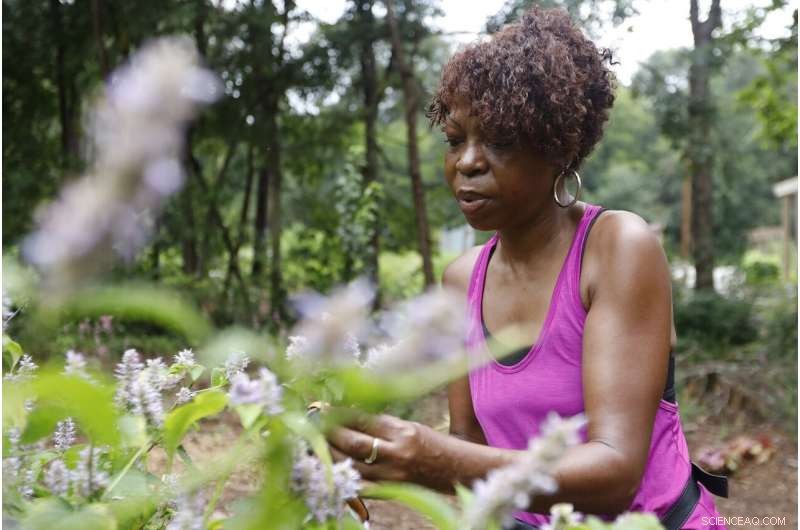
In questo venerdì, July 19, 2019 foto, Celeste Lomax harvests anise hyssop plants in a community garden at the Urban Food Forest at Browns Mill in Atlanta. Lomax lives in a low-income neighborhood in south Atlanta with limited access to healthy food. She said the community gardens provide an alternative food source for volunteers and neighborhood residents. (AP Photo/Andrea Smith)
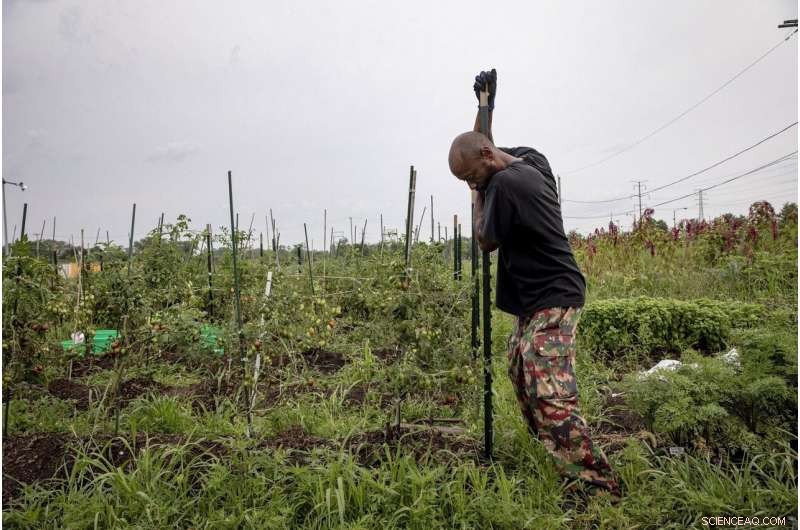
In questo martedì, Aug. 20, 2019, foto, Kamau Rashid works in his garden in the South Chicago Farm on Chicago's south side. Rashid and his wife Safia, started urban farming almost 14 years ago, when their oldest son was 3 years old. "We're doing this out of us feeling the need and responsibility toward our community." Safia Rashid, disse. Living in a neighborhood with little access to healthy foods, so-called food deserts, they set out to fight what they called "food apartheid." (AP Photo/Amr Alfiky)
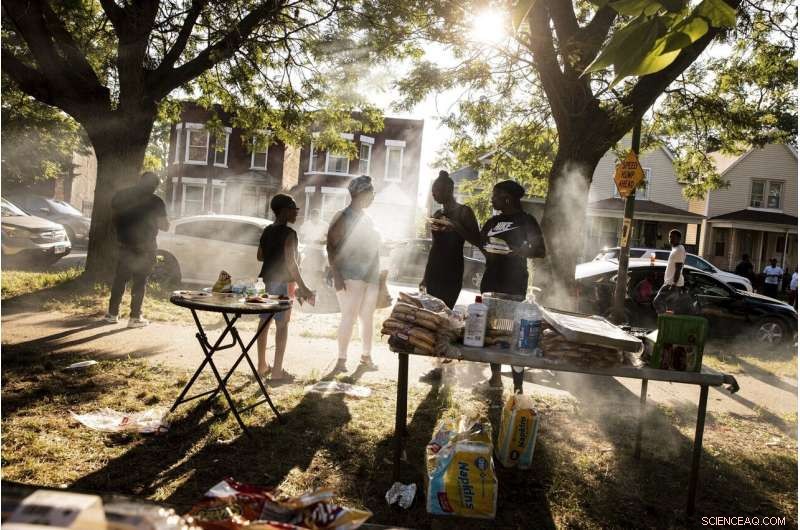
In questo giovedì, 1 agosto 2019, foto, people gather for a barbecue in a vacant lot hosted by Inner-city Muslim Action Network's (IMAN) in Chicago's neighborhood of West Englewood. IMAN seeks to educated people on proper nutrition in a section of the city with low access to nutritional foods. (AP Photo/Amr Alfiky)
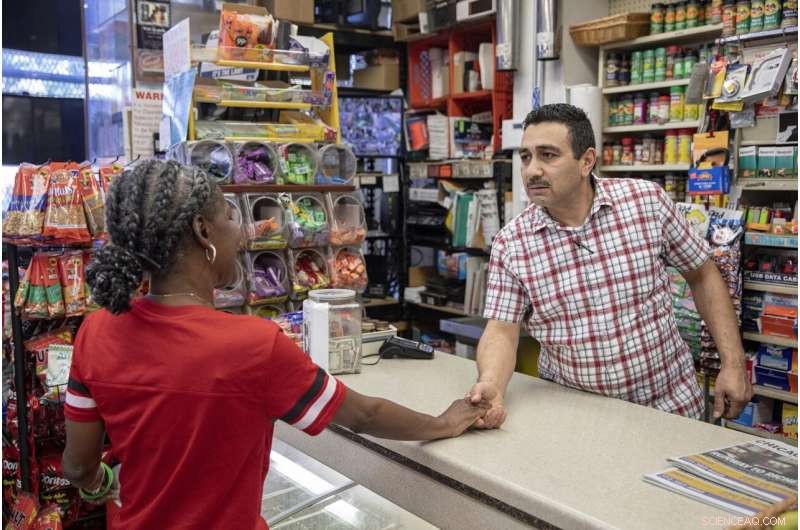
In questo lunedì, 19 agosto 2019, foto, Sami Deffala, owner of the Morgan Mini Mart in Chicago's Englewood neighborhood, Giusto, offers his condolences to a customer who lost her 17-year-old son recently to gun violence in Ohio. Sami Defalla, who runs the small Mart in Englewood, has been an active partner with the campaign for more than two years. Defalla has created a "green zone" in the store where shoppers can purchase inexpensive fresh fruits and vegetables. (AP Photo/Amr Alfiky)
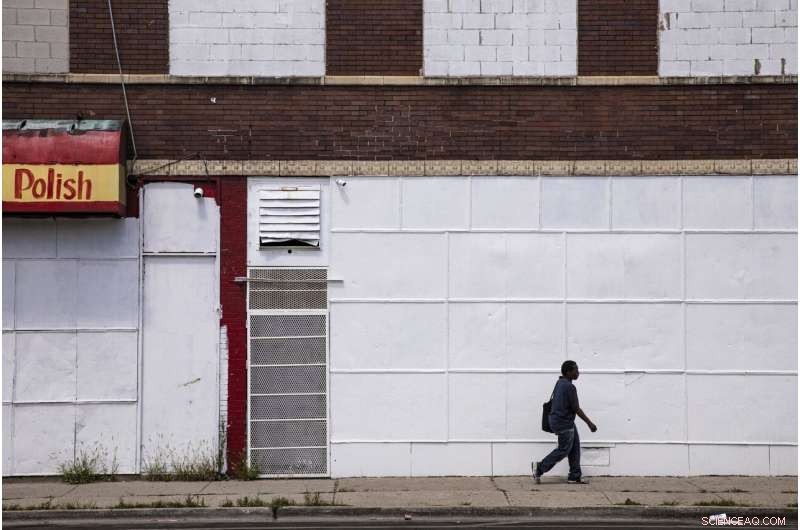
In questo venerdì, 9 agosto 2019, foto, a man walks on a sidewalk past boarded up business in Chicago's Englewood neighborhood. As of 2015, roughly 22% of Atlanta's population was living in a low-income community more than a mile from a food store, and in Chicago, that number is 5%, according to the U.S. Department of Agriculture. (AP Photo/Amr Alfiky)
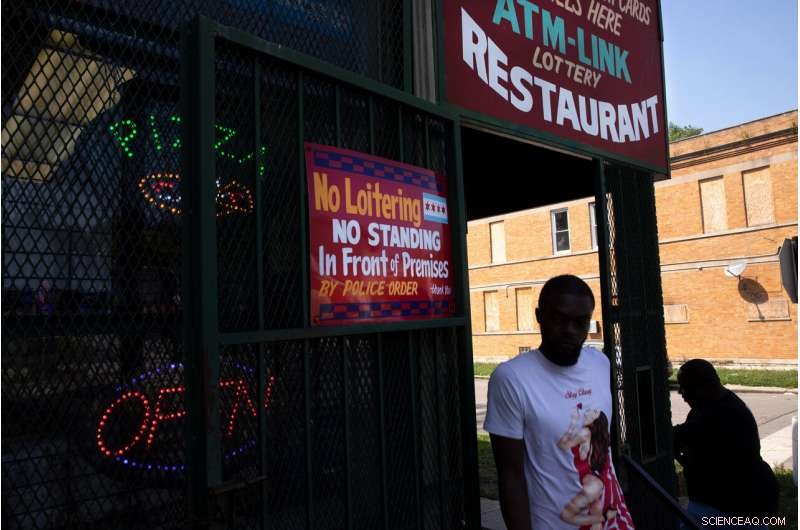
In questo lunedì, 19 agosto 2019, foto, two people pass though the doorway of the Morgan Mini Mart in Chicago's Englewood neighborhood. Sami Defalla, who runs the Morgan Mini Mart in Englewood, has been an active partner with the campaign for more than two years. Defalla has created a "green zone" in the store where shoppers can purchase inexpensive fresh fruits and vegetables. (AP Photo/Amr Alfiky)
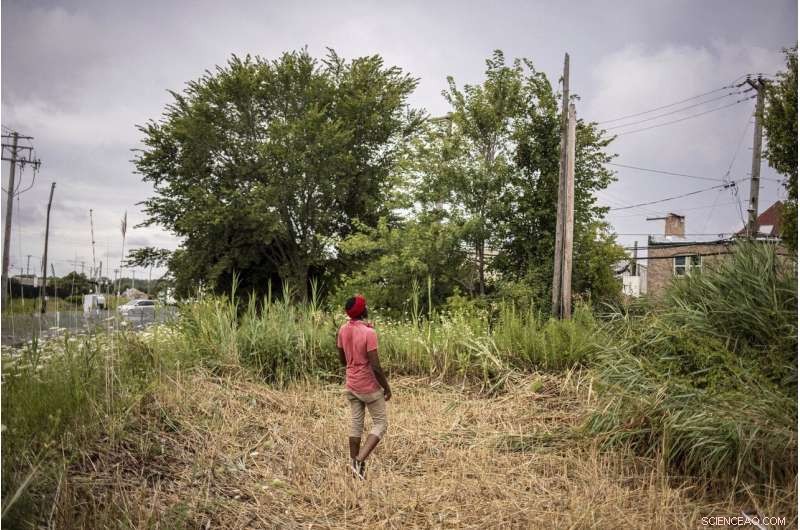
In questo sabato, Aug. 17, 2019, foto, Olisaemeka Okakpu walks into a section of public land consisting of high weeds and brush, that his organization Cooperation Operation plan to clear for an organic produce garden in the Pullman neighborhood of Chicago. (AP Photo/Amr Alfiky)
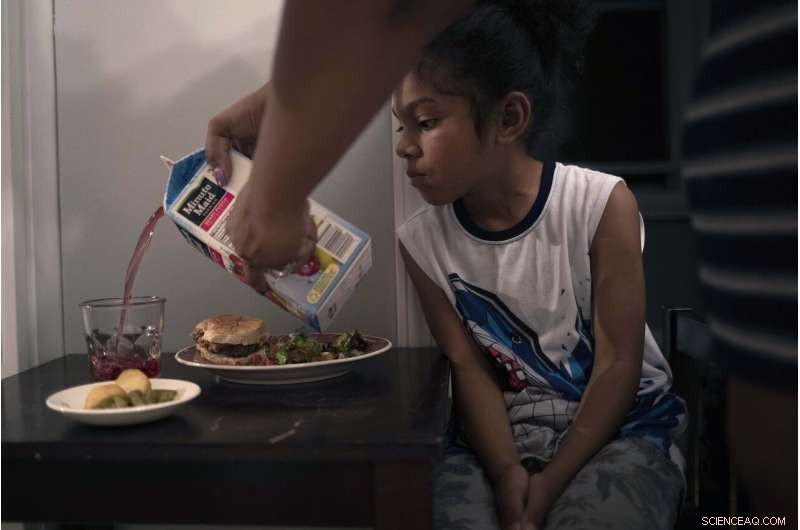
In questo giovedì, Aug. 15, 2019, foto, Kathryn Gatewood pours juice into a glass for her son, Tracy at their home in Chicago's Englewood Neighborhood. "We spend almost 40% of our paychecks combined to ensure a healthier diet for our kids, " lei disse, adding that it is a better alternative than buying bad food from the "dusty shelves" of corner stores in Englewood. (AP Photo/Amr Alfiky)
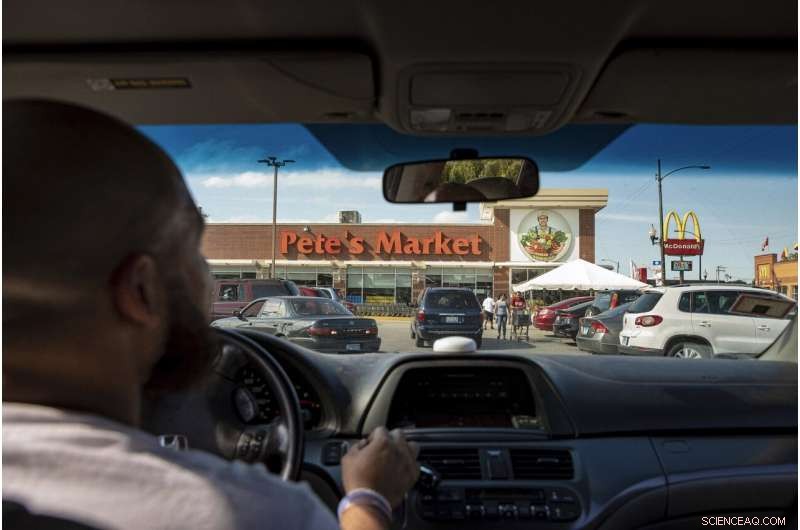
In questo giovedì, Aug.15, 2019, foto, Christopher "Mad Dog" Thomas, drives into Pete's Market in Chicago's Garfield Neighborhood. Thomas organizes a weekly family trip outside their neighborhood to the store, which his wife describes as "the black or Hispanic Whole Foods." (AP Photo/Amr Alfiky)
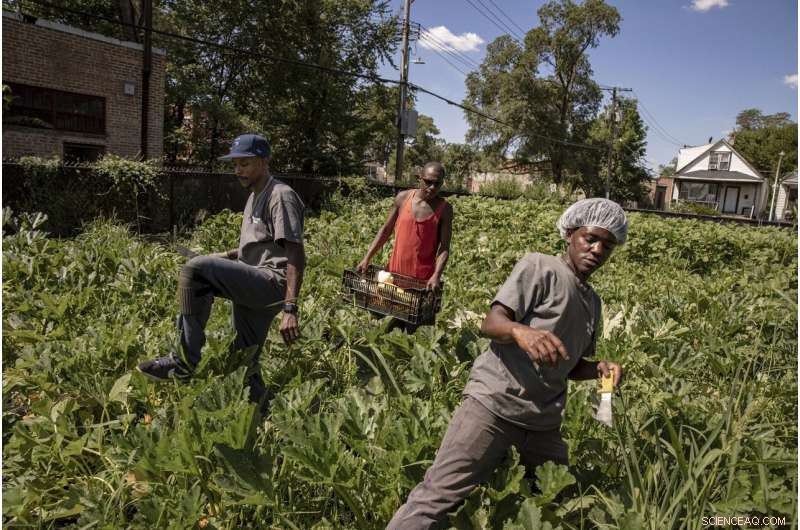
In questo venerdì, 9 agosto 2019, foto, Maurice McCary, sinistra, Stanford Williams, center and Torreyon Simmons, work at the Growing Home, Inc. farm in Chicago's Englewood neighborhood. Large cities across the country are using a multi-pronged approach to bring healthy diets to "food deserts, " mostly low-income neighborhoods located miles away from the nearest supermarket. They hope not only to reduce rates of diabetes, high blood pressure and obesity, but to encourage community activism and empowerment. (AP Photo/Amr Alfiky)
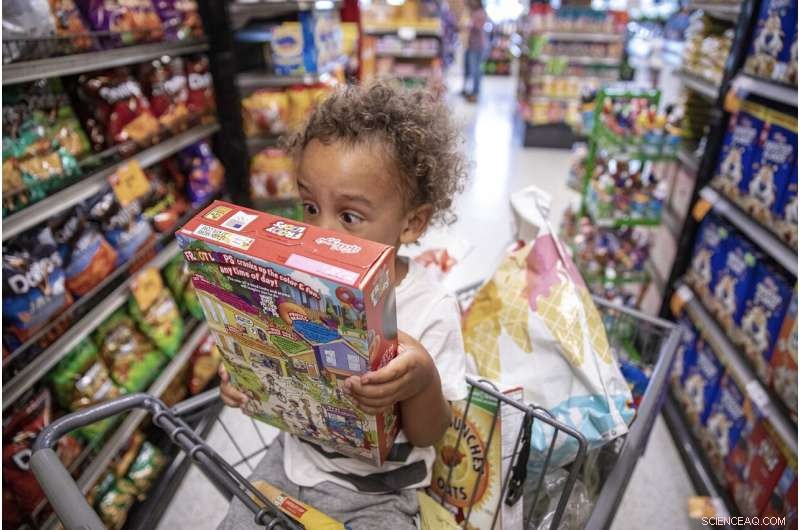
In questo giovedì, Aug. 15, 2019, foto, Rian Gatewood-Hillestad reacts to cartoons printed on a cereal box while shopping with his parents at Pete's Market in Chicago's Garfield neighborhood. Christopher "Mad Dog" Thomas, Rian's father, organizes a weekly family trip outside their neighborhood to Pete's Supermarket, which his wife describes as "the black or Hispanic Whole Foods." (AP Photo/Amr Alfiky)
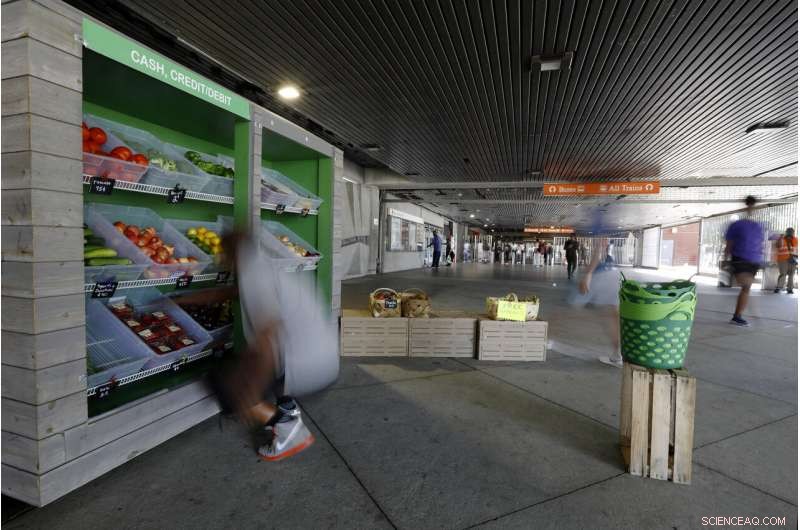
In questo martedì, Aug. 20, 2019 foto, people pass by the Fresh MARTA Market in the West End transit station in Atlanta. The Metropolitan Atlanta Rapid Transit Authority and the Atlanta nonprofit Community Farmers Markets partner to run the stands, which sell food from some Atlanta urban farms. (AP Photo/Andrea Smith)
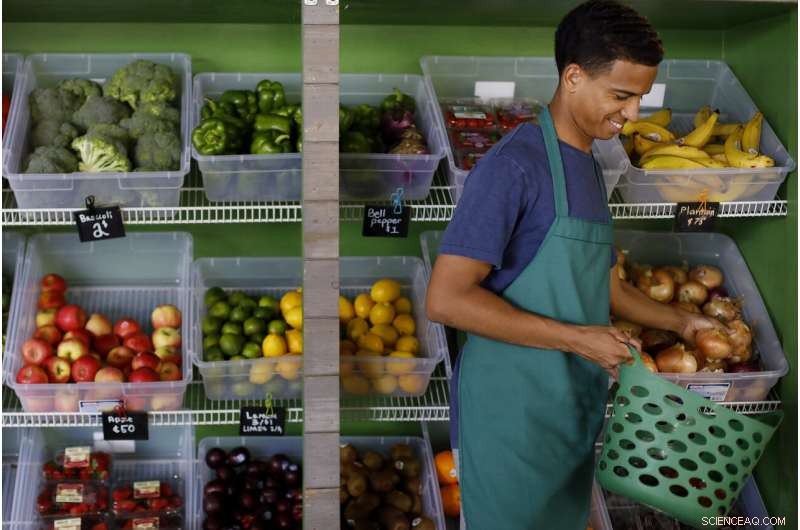
In questo martedì, Aug. 20, 2019 foto, volunteer Xavier Lopez helps a customer select fruits and vegetables at the Fresh MARTA Market at the West End transit station in Atlanta. The Metropolitan Atlanta Rapid Transit Authority and the Atlanta nonprofit Community Farmers Markets partner to run the stands, which provide a healthy food source for people living in food deserts.(AP Photo/Andrea Smith)
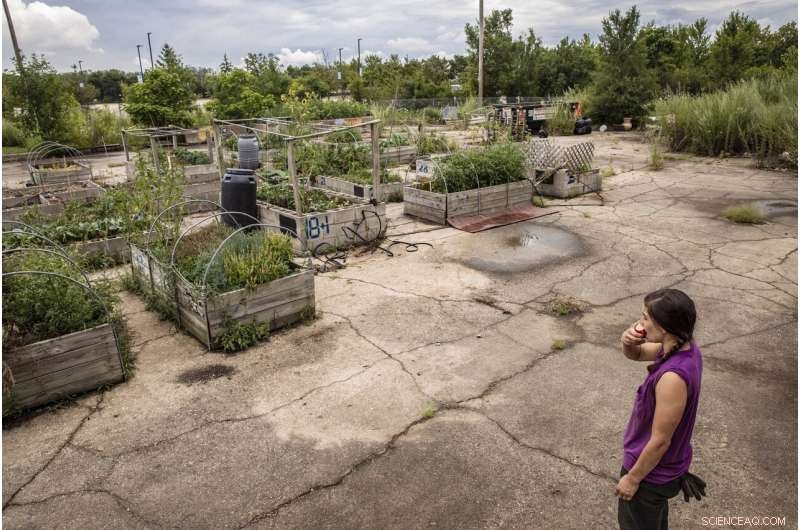
In questo sabato, Aug. 17, 2019, foto, Viviana Gentry Fernandez-Pellon, co-founder of Cooperation Operation, eats an apple as she looks over the successful urban community garden in Chicago's Pullman neighborhood. (AP Photo/Amr Alfiky)
"I wish I had a bigger platform to offer more ... to my customers, " Deffala said.
The Muslim Action Network also operates a health clinic where patients can see a dietitian free of charge and receive coupons for free produce at the nearby farmers market. Every Friday, the group hosts a farmers market where residents can connect with local urban farmers.
As a volunteer in a community garden in Atlanta, Celeste Lomax is finally able to take fresh produce home to her low-income neighborhood, which is located about 4 miles (6.4 kilometers) away from the nearest supermarket.
"We have a right to eat healthy like everyone else does, " lei disse.
© 2019 The Associated Press. Tutti i diritti riservati.